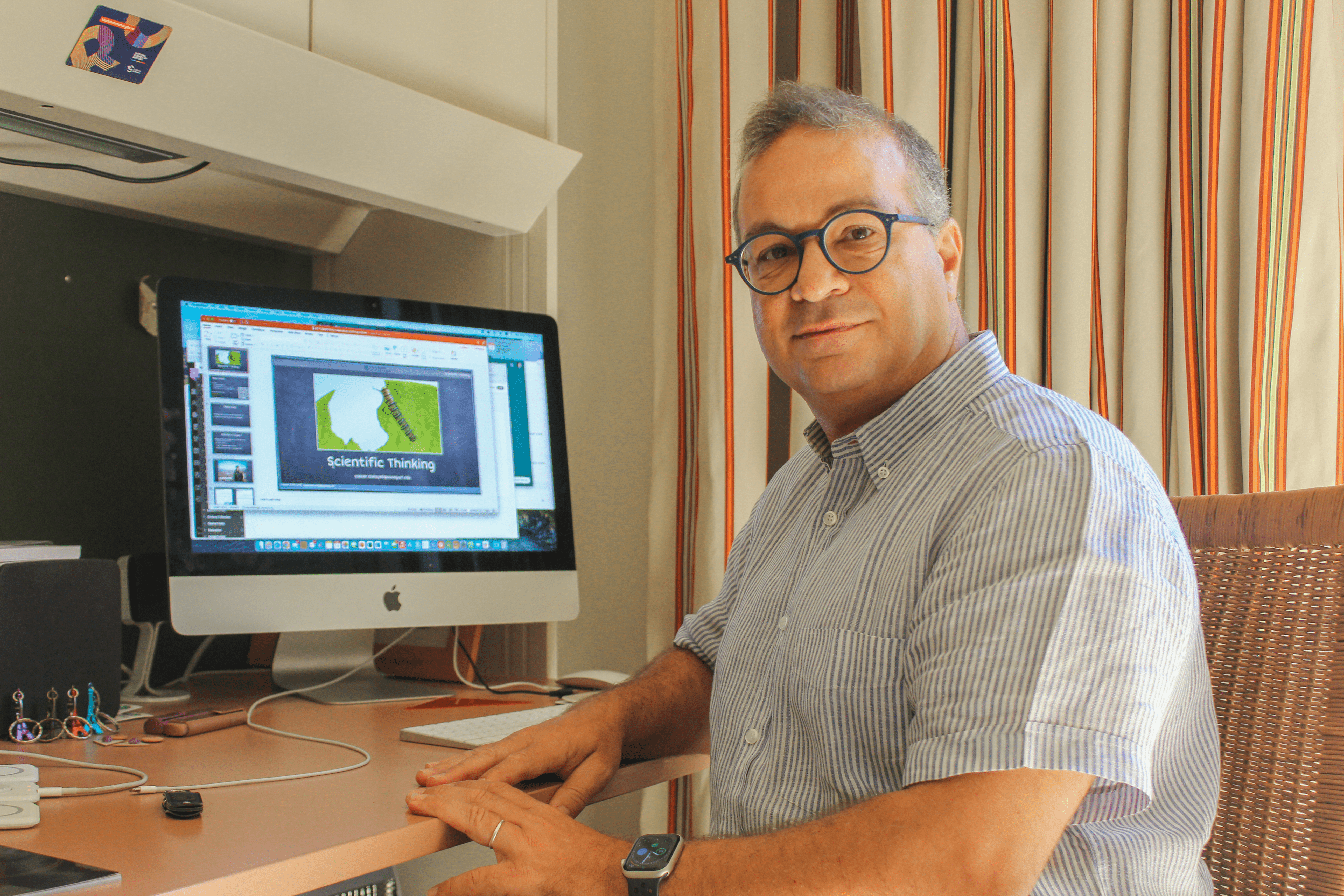By: Sara Fahmy
Photographer: Julia Khlaifat
Walking into Yasser El Shayeb’s office, one quickly confirms that he is a man of science – from the differently sized and coloured rocks laid down on his desk to the poster of a Nature article hanging in the corner.
El Shayeb, now Professor of Scientific Thinking at AUC, graduated from Cairo University with a degree in Mining Engineering.
He then got his PhD at Nancy School of Mines in France on how to use modern technology to discover and preserve old structures such as pyramids, statues, and tombs.
He first joined AUC in 2015 as an adjunct professor to teach Scientific Thinking, a required course imbuing students with analytic skills which enable them to distinguish between science and pseudoscience and overall how to be skeptical.
After a brief stint in 2019 as Chief of Excellence of Water – an AUC project to create a center of excellence for water in Alexandria University, he returned to teaching Scientific Thinking in 2022.
He believes that people often have misconceptions about the course and that it can be difficult, annoying, or even useless.
“When I hear that, it can make me feel bad, but I always tell them [students] to give me an hour or two and I’ll change your mind about it.”
El Shayeb puts in effort to make the students feel comfortable asking questions, debating with him, and not worrying about the professor-student dynamic.
“I try to ensure that there are no barriers between my students and me,” he told The Caravan.
After completing the course, El Shayeb hopes that students will gain the ability to think, question, and organize their thoughts scientifically.
During our talk, El Shayeb passionately described his love for rock engineering which led to a paper he co-wrote in Nature magazine titled “Discovery of a big void in Khufu’s Pyramid by observation of cosmic-ray muons”.
The paper, which he calls his pride, seems to have been his destiny from the time he went to study in France, surrounded by people who, as El Shayeb put it, were “critical, questioning, and curious”.
With his skepticism and scientific thinking beginning to emerge, he began to implement what he learned from his studies there. El Shayeb aims to foster that same wonder and curiosity in his students; he wants them to realize that everyone is an equal regardless of their background, whether it is science or humanities or something else, everyone can think scientifically. El Shayeb hopes that students who enter the course can free their minds.
He also wants to break down the stereotype that only engineers can be successful. Some students go into the course thinking that having a scientific background will make it easier; that, he believes, is not true.
“What I like to achieve actually is to convince students no one is better than anyone,” said El Shayeb.
El Shayeb is constantly looking to interact with as many people of different backgrounds as possible, which is why AUC was the perfect environment where he wanted to teach.
“I make sure that I am not inside a bubble and interact with as many people with different backgrounds as I can,” he explained.
Although he always encourages people to be skeptical about many things around them, he also ensures that he takes a break from skeptical thinking in order to rest.
“What prevails is the value of good work, you can fool the people, but you won’t be able to fool them all the time,” El Shayeb told The Caravan, on the secrets of his success.
His teaching assistant, Ahmed Kazlak, a graduate of Mansoura university’s pharmaceutical department who is currently doing his Master’s degree at AUC in Biotechnology, shared how his scientific thinking also started early in his childhood.
Working with El Shayeb and listening to his lessons helped him develop his ability to listen to others and value other people’s opinions over wanting to be correct.
“Usually, people working in the fields of science can be quite stubborn; Scientific Thinking helped me realize that instead of
telling people the answer, I should help them think about the answer,” Kazlak explained.
Business freshman Martina Emil, who is a currently taking Scientific Thinking, described the course as “really fun” because El Shayeb always encourages the students to have debates and open discussions with each other.
“I’ve learned about being open-minded, skeptical, and questioning of everything around me, and trying to know what’s actually true,” Emil said.
